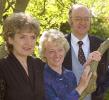Spoken Word Reviews 2007
Packhorse Poets - Poetry at the Packhorse

There have not been many full houses on the Fringe this year, what with the weather and all, but the rural community seem to have it sussed. First the Young Famers overfill the Paxton Suite two nights running and now The Packhorse Poets burst the back room in their eponymous hostelry in Crowdecote.
There were more than 40 in the audience. Plus a dog, a charming Cocker Spaniel with extraordinarily long eyebrows!
First up was local guest poet Roy Fisher. Roy started out in Birmingham but has been in this area for 25 years so just about qualifies for the epithet. He started with his well known epic poem "Epic". This is the shortest epic poem in any language. It is not Homer but it is very funny. He followed this with another witty poem called "Poetry Promise" and finished with the more elegiac "Badger's Belly Mark". In all, a nicely judged introduction to the evening, very well received by all.
Second professional on view was Cynthia Fuller who read poems from her latest book "Jack's Letters Home". This was a Poetry Book Society recommendation last year. It is based on the letters of the man who would have been her uncle had this series covering his call up and experiences in the trenches of the First World War not been cut short by his death in action. The generation of those directly involved is nearly gone and our generation of those with a connection to a participant is thinning. This is a timely exercise movingly written and presented. The movement is from banality and ordinary decency to the horrors of the front and finally to the almost anticlimactic tragedy at the end, the body never found. The known soldier. This was the meat course and deeply affected all those there.
After the break, Sue Graukroger, the organiser kicked off the group session. The Packhorse Poets seem a lively and entertaining bunch and were fortified by the fraternal visit of Buxton's Monday poets on this occasion. They meet on the third Wednesday of the month at the Packhorse in Crowdecote (which incidentally serves very good food and has a decent wine list). All are welcome, Sue's number is 01298 83269.
This event was a charming addition to the Fringe. It was lovely to get out of Buxton in the heat of it all. I hope they come again next year. Thank you all.
John Wilson
Wyn Hobson - Wyn Hobson - A Solo Recital of Poetry

Yesterday's performance by the Poetry Trio set a very high standard to follow, and I wasn't disappointed by Wyn Hobson's solo recital. Again, the selection of material was excellent and included a few old favourites as well as some less familiar works. Hobson's delivery is faultless, sensitive and never either uncertain or over-stated.
Although this recital had no particular theme, it was certainly easy to make links between the works. The themes of independence and loneliness recurred throughout, and these - particularly in Hobson's own work Sir Malcolm Sargent's Last Night at the Proms - made interesting parallels with the 'Colour and Light' recital. Today's was a more emotional experience, an advantage perhaps of the more personal choice of poems.
It is a shame that we were only treated to the one show (well, two including the 'Colour and Light' with the Poetry Trio). The effort that has clearly been put into this - and the sheer quality - deserves a longer run, and I hope this will be considered next year when they will hopefully return.
Nick Butterley
The Poetry Trio - Songs of Colour and Light

It's a simple, effective and thought-provoking, concept: poetry about painting. The concept is presented in an uncomplicated format, with the trio reading brief introductions to the poems before performing the works themselves with clarity and skill. Prints of a number of the paintings referred to were also displayed, helping to build the mood and remind us of some of the features described or referenced by the writers. The environment was immediately welcoming and friendly, and we were given a very well-produced handout listing the programme. If one were to be hyper-critical, this would be further enhanced by a listing of the paintings referenced and where they may be seen, although I must admit that I'm looking forward to tracking down the ones I was most intrigued by.
The theme was loosely sub-divided and ideas developed over the course of the recital. A couple of very amusing works explored the thoughts and feelings of the subjects and sitters: boredom, frequently, or disgust at the way they have been dressed up or portrayed. Marilyn Chandler McEntyre offers us a wonderful image of the Girl in the Red Hat "startling the ducks" by throwing it into the river, and U. A. Fanthorpe's interpretation of Uccello's dragon complaining about having legs omitted for the sake of a geometric commitment to triangles struck a particular chord with at least one member of the audience who has heard innumerable remarks on the significance of his acute sense of perspective. But it is hard to accept Fanthorpe's assertion that "these artists take themselves too seriously" when we have just heard in detail the power that the artist wields in the world they create.
This illusion of power was shattered in one of the most poignant works of the recital, the anonymous He Always, dealing with the repression of artistic spirit by an over-structured education system. Then the frailty of artists and the challenges facing them were considered, with the frustration at their inability to put their vision on paper being described by Adrian Henri and Elizabeth Jennings. Surely this is their own frustration at the limitations of their medium being displaced? Finally, the question of style and perception is presented, culminating in the most emotional poem of the recital, Lisel Mueller's Monet Refuses the Operation, inviting the listener to be sympathetic to the point of jealousy about the world he perceived with its 'gas-lamp angels' and no horizons.All of this is merely my response, and I'm sure others saw things entirely differently. I think that's the point.
Huge credit must go to Christine Adams, Sandra Appleton and Wyn Hobson for their choice of material and the all-round quality of this production. It's a shame this was a one-off show - I would thoroughly recommend it to anyone with an interest in art, poetry, and creativity in its broadest sense. A final quote from Fleur Adcock: "Art is what you choose to frame" and it was framed beautifully here.
Nick Butterley
Writers' Reign - Poetry, Prose and Performance

As the title suggests, inspiration for the artists involved in this performance was taken from a variety of sources. From the everyday to the ethereal, nothing was left unexplored. On the one hand this meant the event was somewhat disjointed; the performances having little to tie them together but their author's provenance. On the other hand, there was a similar excitement one gets when rummaging through the Topshop sale bin, there is always the chance you are going to find a real gem!
The best performances were the ones where the artist had something very personal or at least specific to say. These pieces engaged the audience to such an extent that any naivety of performance could be forgotten. Performances like this are the sounding boards of real talent and well worth taking the time to go to. Because when one of these guys makes it big, you can say 'I was there'.
Dale Copley
Fringe Promotion - Fringe Readings
Taking the time out to enjoy simple pleasures is something many of us promise to do, and the Fringe has scheduled an ideal opportunity for everyone to make a start. Go along to the welcoming (and dry!) atmosphere of a reception room at the Old Hall Hotel to find the perfect setting for a reading presented by a different performer for each session. The first reading attracted a grateful audience and together we were transported by the delightful characterization of two extracts from a book unknown to me, and it didn't matter! Go along, listen, rest your feet and be reminded of how easily being read to can transport you to somewhere else even if only for a moment or two.
Mala Bhaumik
F. Philip Holland - Poetry and Piano

A very simple recipe - a short introduction, a little music and a reading of one of his poems. Repeat, varying the music and the poetry, and serve warm to a satisfied audience.
Philip has an easy manner and a comfortable voice that gently washes over the attentive audience, drawing them in to his work. With many of his poems having a nature theme: buzzards, bats and hedgehogs, Philip could have a slot of his own on next year's Springwatch.
A humorous poem titled "The Menu" proved popular, with spontaneous applause breaking out, partly for the sentiment and partly for the delivery. "The Gather" was a little more sombre, but clearly touched a chord with some of those in the audience. Some were of local flavour, with "The Slaughter" drawing on Philip's farming days and "Magpie Mine" recalling the days when lead mining was an important part of local industry. "Youn 'af fert' flit", a piece in the Derbyshire dialect told a sad folk tale. Not every word was necessarily understood by those of us not from the region, but the story and the sense were easily followed and wonderfully conveyed and acted by the writer. (Philip's latest publication of his recent poems, "Fourth in line" contains a translation, which surely is good enough reason to purchase it in itself!)
In short, to spend time in the company of this genial man, with his poems book-ended by a little light piano playing is a very agreeable way to spend an hour, and one I commend to you.
"The village organist aspires
To play the tunes that God desires.
And by the light of sun or moon,
Just hopes the angels sing in tune!"
From The Village Organist, by F Philip Holland
Maria Carnegie
7 July 2007